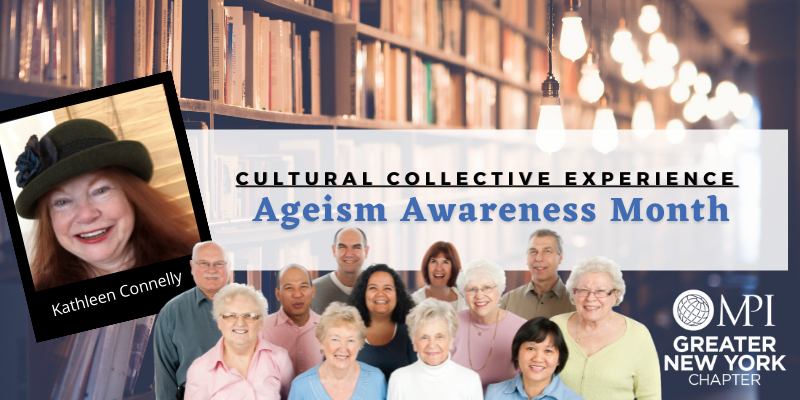February 19, 2026
MPIGNY is bringing Mardi Gras to NYC this winter!
SAVE MY SEAT
July 23, 2026
Join MPI Greater New York for our annual Golf Outing!
SAVE THE DATE

Ageism in the Workplace

How old is too old when you’re seeking employment?
I remember having that discussion with my friend Irene twenty years ago, after she was downsized out of a job she loved and reluctantly began the search for another. She had a long and stellar work history in her chosen field and glowing recommendations from past employers, including the one who had just regretfully let her go. (The economy is no respecter of persons!) In addition she was smart, attractive, and terrific with people. Employers should have been falling over each other to hire her, right? Wrong. Turns out Irene had one major liability: she was sixty years old.
Fast-forward to today. My friend Genia, a meetings professional with decades of experience, received a major promotion and then was inexplicably downsized out of her job. Like Irene she has qualifications and people skills that should have companies panting to hire her, but she also has the same problem. She’s sixty years old, and she doesn’t want to retire yet.
I thought things had improved since Irene ran up against the ageism wall. (She did eventually find a job, by the way, but it took two years.) Call me naïve, but I was surprised by this statistic in the February issue of Forbes: “The number of people over the age of 55 who are participating in the workforce is down by 2 million, compared to pre-pandemic levels.”
Genia can vouch for that. Like Irene before her, she’s discovered that her age is a problem. As she told me when we talked about it via email, “I’m finding that ageism is a very REAL thing.” Despite her impressive and extensive resume, hiring managers (so far all younger than she is) talk down to her and ask her to “do performance assessments for jobs I've applied to as if I need to prove my years of professionalism.” Their job descriptions list myriad responsibilities and skills that can best be accomplished by a veteran professional, yet they prefer to hire inexperienced candidates as if they expect the necessary abilities to magically appear.
Why? Because it’s cheaper. It’s an attitude reminiscent of the idiocies I encountered as a disabled employee. Companies are afraid older and/or disabled workers will damage their sacred bottom line. Corporate wisdom has it that seniority means older workers cost more in increased salaries and benefits, that they can’t be re-trained easily or at all for new technology, that they take more sick days than younger colleagues, that they have less energy, are just coasting along until retirement, etc. All of which is, for the most part, utterly ridiculous.
Nevertheless, “Age Discrimination Continues to Hold Older Workers Back” as an AARP article stated in May of this year. Ageism is actually more prevalent in the workplace than in previous years. Depressingly, “…current data shows that 78% of older workers say they have seen or experienced age discrimination in the workplace, the highest level since AARP began tracking this question in 2003.” This is despite the fact that older workers “are continuing to learn new skills. They are also interested in future training, particularly at the behest of an employer, even in the midst of a pandemic.”
So what’s to be done?
Fortunately older workers have their own version of the Americans with Disabilities Act (ADA). According to the U.S. Equal Employment Opportunity Commission (eeoc.gov), 1967’s Age Discrimination in Employment Act (ADEA) kicks in when the employee turns 40. As I know from my own experience as a disabled employee, the harassment and financial discrimination I experienced did not stop until the passage of the ADA. I am not litigious by nature and hated to do it, but when I went to Human Resources and figuratively waved the ADA at them they were suddenly very anxious to amend discrimination they had ignored before. Depending on your circumstances, the ADEA could be a valuable tool.
And of course trusty old Google is always a help. Since there are so many of us baby-boomers now nearing retirement age, we have, somewhat ironically given this topic, become big business. A quick search found scores of useful articles on how to cope with ageism in the workplace, how to find a new job if you’re on the shady side of fifty, etc. To get you started check out AARP.org, Indeed.com, and thebalancecareers.com.
As for Genia, she plans to keep searching. She told me she sees it as similar to navigating the mirrored walls of a funhouse. There may be times the distorting mirrors reflect you the way some of the hiring managers see you, and if you’re having a discouraging day you may wonder if they’re right. But then you find a true mirror that shows you the way you know you really are: strong, capable and courageous. And going where that mirror directs will prove to be a turn in the right direction. As Genia wrote to me, “Is it frustrating looking rejection in the face repeatedly? Of course! But with seniority comes tenacity. Yes, you’re old. But you’re also old enough to know that anything worthwhile is worth fighting for.”
She is absolutely right. And I would add to that -- you’re NEVER too old.

Leave a commentOrder by
Newest on top Oldest on top